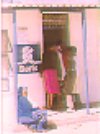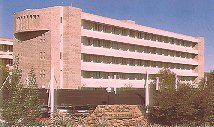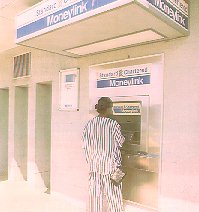


The Government of Botswana believes that positive real interest
rates, together with a stable financial system, an equitable tax
structure and sound fiscal policy, must be established and maintained
as a prerequisite for the more complete liberalisation of the
country's foreign exchange regime.

The financial district of Gaborone, with First NAtional Bank building on the left, Finance House, Barclays House and Posa House in the distance. Top right: Customers queue outside the Molepole branch of Standard Chartered Bank.
With a view to improving efficiency throughout the financial system, the government encourages competition between the development finance institutions and private sector financial institutions. The most significant recent development for banking in Botswana was the further progressive liberalisation of exchange controls - this involved upward adjustment in the limits on externally remittable allowances and commercial transactions for both citizen and non-citizen companies and individuals, resulting in delegation of more authority to authorised dealers for approval of a variety of external transactions. This was also followed by the government's announcement of its intention to move from Article 14 to Article 8 of the International Monetary Fund's Articles of Association, which entails removing restrictions on international current transactions.
CENTRAL BANKING FUNCTIONS
The objectives of the Bank of Botswana, established to carry out the central banking functions, were stated in the Bank of Botswana Act of 1975,. These included the following :
In addition to the Bank of Botswana Act, the Financial Institutions
Act and the Exchange Control Act were approved by parliament in
order to regulate the functions of commercial banks and other
financial institutions in Botswana and to control the outflow
of capital as a means of minimising national debt and maximising
national reserves.

Bank of Botswana building in Gaborone.
The Bank of Botswana stands at the apex of the financial system, providing not only all the services of a central bank but also some services which arise because of Botswana's relatively strong financial position. The bank acts as a deposit taker of last resort for commercial banks, parastatal bodies and any other individual or business which is able to meet certain necessary criteria. In this respect the bank, in 1991, started to issue Bank of Botswana Certificates - these are regularly auctioned to banks and other authorised entities with excess funds and are a forum for market determination of the level of interest rates, in accordance with the government's market-oriented interest rate policy.
COMMERCIAL BANKING
Financial services are offered by commercial banks which provide a wide range of retail banking services, with some boasting an extensive branch network throughout the country. With no new commercial banks having started operations in Botswana during 1993, there are currently five such banks; these include Barclays Bank of Botswana, Standard Chartered Bank Botswana, First National Bank of Botswana, Zimbank Botswana and Stanbic Bank Botswana.
Changes in the banking industry included the merger of the Financial Services Company and First National Bank of Botswana. The merger mechanism resulted in the listing of First National Bank of Botswana Stock Market - along with some local shareholding, although the majority shareholding (70 percent) still vests with First National Bank of South Africa. Major benefits of the merger are the significant increase in size of this financial institution and the broadening of its product range, thus resulting in increasing its potential for effective competition with the long-established commercial banks in the market. A further development during the year was the change of name by the Union Bank of Botswana, a wholly owned subsidiary of Standard Bank of South Africa, to Stanbic Bank Botswana, so as to conform to the group corporate identity.
The continued recessionary trends in the Botswana economy during 1993 extended their detrimental effect on business generally, although Standard Chartered does not expect the large bad debts provisions to recur, believing that there is a sound platform for future business growth as and when good risk opportunities arise. Completion of their network of ATMs will include Maun, Mahalapye and Palapye during 1994. The number of ATM outlets for Barclays, too, has increased, with a customer service initiative being piloted in the first half of 1994.
DEVELOPMENT FINANCE INSTITUTIONS
These supplement the role of commercial banks, offering specialised
services which may be targeted to given economic sectors and areas
of economic activity, as provided for under their respective enabling
legislation. Such institutions include the National Development
Bank, Botswana Savings Bank, Botswana Building Society and Botswana
Co-operative Bank. In addition there is ulc (Pty) Ltd, a credit
institution which specialises in leasing, hire purchase and factoring
services.

The total of ten branches of the Botswana Building Society is indicative of the expansion of its operations, with further expansion of its commercial banking services planned in order to offer a more flexible business environment.
A customer at the automatic teller machine of the Broadhurst branch Standard Chartered Bank. ->
ENSURING FUTURE SECURITY
Insurance companies in Botswana provide the full range of every type of insurance, catering to large multinational corporations as well as to individuals. In providing comprehensive and dependable services, insurance brokers such as Eagle, Sedgewick and Ngamiland Trust, offer a high degree of professionalism, innovation and flexibility.
STOCK MARKET ACTIVITY
Activity in the stock market over 1993 was minimal. With the takeover of IGI Botswana by Botswana Insurance Holdings, the number of listed companies fell from 11 to 10. The Botswana Stock Exchange Bill is expected to be submitted for consideration by parliament during 1994 and, with its passage, the stock exchange is expected to become more closely linked to developments in the rest of the world, attracting new listings, encouraging the inflow of foreign capital, and providing Botswana with enhanced access to equities as a form of saving and a means of participating in the benefits of private sector growth.

 go back
go back